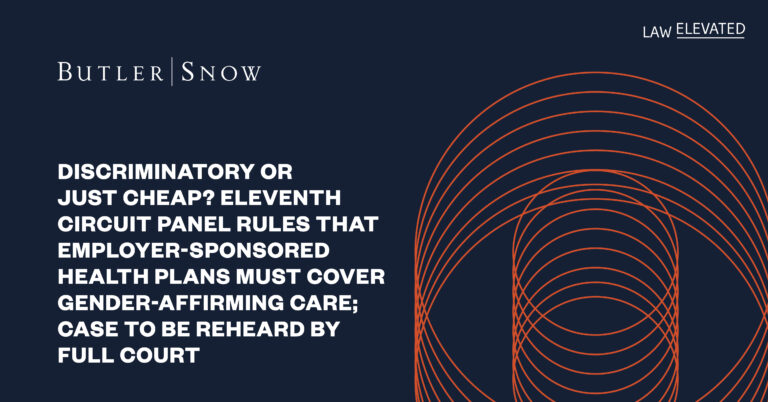In its 2020 decision in Bostock v. Clayton County,[1] the United States Supreme Court ruled that Title VII[2] of the Civil Rights Act of 1964 prohibits covered employers from discriminating against employees based on their transgender or homosexual status. A three-judge panel of the Eleventh Circuit Court of Appeals, which covers Alabama, Georgia, and Florida, recently held that employers who sponsor group health insurance plans must cover gender-affirming medical care for their transgender employees or face liability under Title VII.[3]
Anna Lange, an employee of the Houston County Sheriff’s Office in Georgia, requested coverage for sex change surgery from the County’s group health insurance plan in which Lange was enrolled. The County refused to pay for Lange’s sex change surgery pursuant to an exclusion in the plan for “drugs for sex change surgery” and “services and supplies for a sex change and/or the reversal of a sex change.”[4] Two of the three judges on the Eleventh Circuit panel ruled that the health’s plan’s exclusion discriminated against Lange on the basis of sex in violation of Title VII and affirmed a jury’s award of $60,000 in damages to Lange. The Court also affirmed the decision of the lower court to strike down the exclusion.
Judge Andrew Brasher dissented from the decision of the other two judges and pointed out that he would have decided the case differently. Judge Brasher determined that the County’s plan does not discriminate against transgender people: the plan covers basic treatments for hormone replacements from an endocrinologist and sessions with a psychotherapist; the plan just excludes sex change surgery.[5] Judge Brasher also pointed out that the County’s plan also excludes other expensive surgeries, cosmetic procedures, and treatments for sexual dysfunction. Instead of discriminating against plan participants on the basis of sex, the plan simply didn’t pay “for the constellation of medical procedures known as a sex change.’”[6] Ultimately, Judge Brasher concluded that the plan “isn’t discriminatory; it’s just a cheap plan.”[7]
Importantly, on August 15, 2024, the Eleventh Circuit vacated the panel’s opinion and voted to re-hear the case as an entire Court. This means that the panel’s determination that employer-sponsored health plans must cover all gender-affirming care, including sex change surgery, is null and void. The Eleventh Circuit will receive additional briefing and argument in the case before issuing a new opinion, which will likely come out some time next year. In the meantime, employers in Alabama, Georgia, and Florida who sponsor health plans need not change any of their current coverages. However, these employers should be aware that this issue is currently being litigated and will be determined—one way or another—soon.
[1] 590 U.S. 644 (2020).
[2] 42 U.S.C. § 2000e-2
[3] Lange v. Houston County, 101 F.4th 793 (11th Cir. 2024), rehearing en banc granted and vacated at 110 F.4th 1254 (11th Cir. 2024).
[4] Lange, 101 F.4th at 796.
[5] Id. at 802.
[6] Id. at 804.
[7] Id. at 805.
